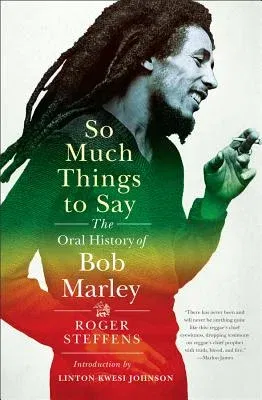Roger Steffens is one of the world's leading Bob Marley experts. He
toured with the Wailers in the 1970s and was closely acquainted with
Bunny Wailer, Peter Tosh and the rest of the band members. Over several
decades he has interviewed more than seventy-five friends, business
managers, relatives and confidants--many speaking publicly for the first
time. Forty years in the making, So Much Things to Say weaves this
rich testimony into a definitive telling of the life of the reggae
king--the full, inside account of how a boy from the slums of Kingston,
Jamaica, became a cultural icon and inspiration to millions around the
world.
The intimacy of the voices and the frankness of their revelations will
astonish even longtime Marley fans. Readers see the intense bonds of
teenage friendship among Peter, Bunny and Bob, the vibrant early
sessions with the original Wailers (as witnessed by members Junior
Braithwaite, Beverley Kelso and Cherry Green) and the tumultuous
relationships with Rita Marley and Cindy Breakspeare.
With unprecedented candor, these interviews tell dramatic, little-known
stories, from the writing of some of Marley's most beloved songs to the
Wailers' violent confrontation involving producer Lee "Scratch" Perry,
Bob's intensive musical training with star singer Johnny Nash and the
harrowing assassination attempt at 56 Hope Road in Kingston, which led
to Marley's defiant performance two nights later with a bullet lodged in
his arm.
Readers witness Marley's rise to international fame in London, his
triumphant visit to Zimbabwe to sing for freedom fighters inspired by
his anthems and the devastating moment of his collapse while jogging in
New York's Central Park. Steffens masterfully conducts the story of
Marley's last months, as Marley poignantly sings "Another One Bites the
Dust" during the sound check before his final concert in Pittsburgh,
followed by his tragic death at the age of thirty-six.
So Much Things to Say explores major controversies, examining who
actually ordered the shooting attack on Hope Road, scrutinizing claims
of CIA involvement and investigating why Marley's fatal cancer wasn't
diagnosed sooner. Featuring Steffens's own candid photographs of Marley
and his circle, this magisterial work preserves an invaluable,
transformative slice of music history: the life of the legendary
performer who brought reggae to the international stage.

